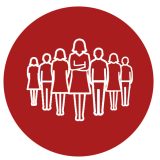Fewer women than men apply for EU projects funds in our organization. According to the quantitative assessment undertaken in 2015, funded research project coordinators were 18 in total, of which 27% females. Additionally, the total amount of female researchers’ grants was on average 144,670 EUR while male researcher’s grants was 613,171 EUR respectively indicating a lower success rate for the women that did apply compared with their male colleagues. In the National Funding programs, the gap was significantly smaller: 110,000 EUR for female researchers while 136,800 EUR for males.
In 2017, the gender gap in the Project coordination became wider: among 29 project coordinators, only 3 were females. This represents a 10 – 90% distribution compared to 28 – 72 distribution in 2015. However, in the average amount of funding, the gap has diminished – 200,000 EUR was the average amount received by females, while the males received on average 376,000 EUR. This is 35 – 65% distribution.


